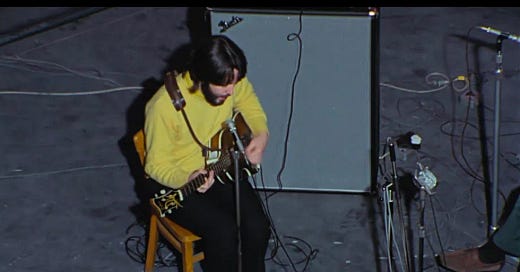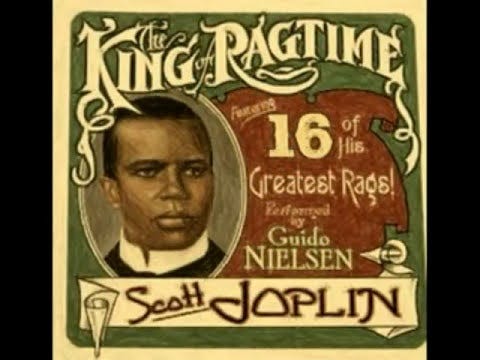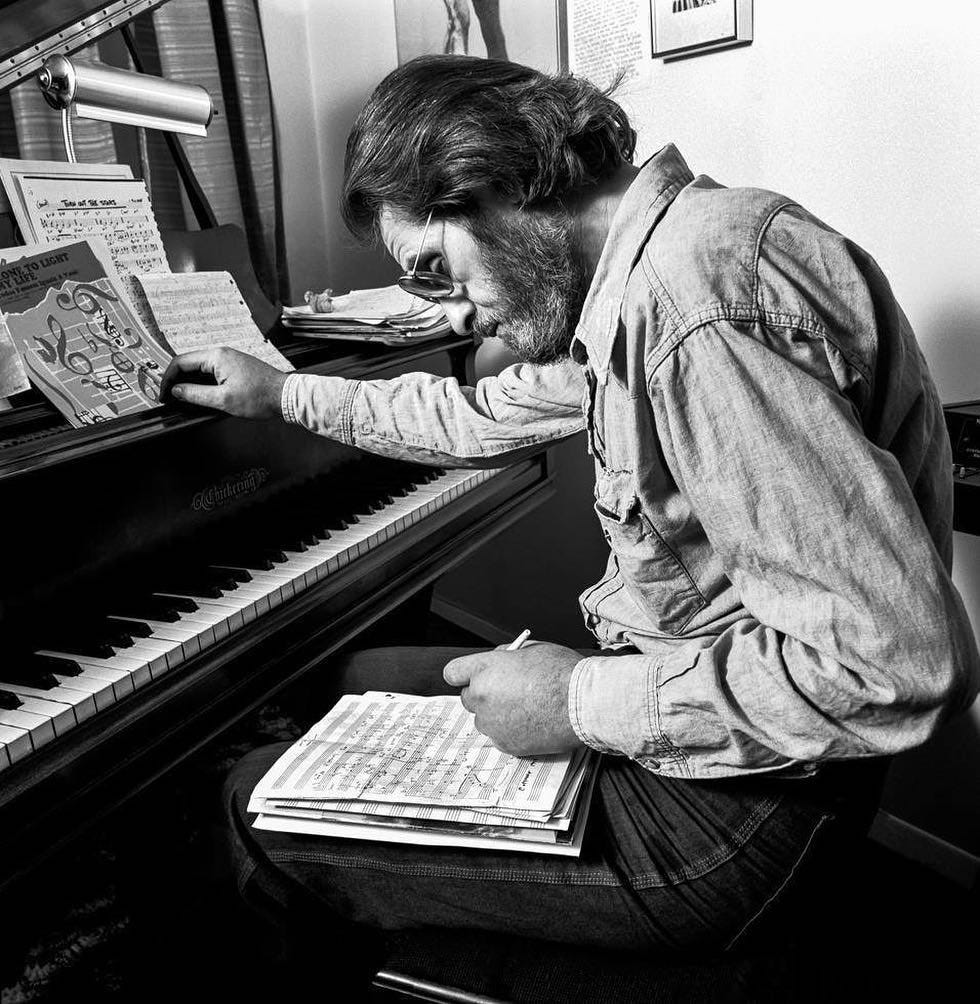“I don’t see music as dots on a page,” said Sir Paul McCartney. “It’s the little I can’t do.” The Beatles couldn’t read music. There is a scene in Peter Jackson’s Get Back where you see Paul, bearded in a yellow sweater, coming up with “Get Back” while George and Ringo look on and sing along to the chorus of this thing that is being created in front of their eyes, even while George is yawning. A song is written, yet nothing, in this case, is written down. George Harrison was asked by Dick Cavett if he regretted never learning composition. “No,” he said adding, “I could have saved money paying a copyist.” But there was no need for a copyist when we see Paul McCartney create something out of what appeared to be thin air. God created a waterfall, all on the spot. By the time John is the last to wake up, “Get Back” is in the world. John asks, “Is Tucson in Arizona?”
I first knew my way around a keyboard at 5, when, like many children, I played Scott Joplin’s “The Entertainer.” I loved hearing my father playing “The Graceful Ghost” and “Maple Leaf Rag,” and there had been many songs finding their way into my head, but “The Entertainer” was the first one that I translated to the keys. The most beautiful rags, I discovered, were the sad ones. But I wasn’t ready for that yet. It was as if I needed to be in possession of entertainment itself—to entertain, to be entertained, all at 5. My sheet music was a tie-in with The Sting, and I probably looked at the picture of Paul Newman more than the notes on the page. I had become so addicted, I remembered the whole thing, and could then reproduce it myself. I had done this with such sprezzatura, it was not obvious to anyone—not my parents, not my teachers—that I had learned the whole thing by ear, which felt like getting away with something. I knew those dots on the page stood for the things I was playing, but they seemed like speed bumps. I was making a direct delivery. I didn’t tell anyone, because I knew that I was missing a crucial step. I was cheating. I was in a lying stage of childhood. For some reason, I told my entire Kindergarten class I was moving to California. I knew I would get caught—I did, of course, and was duly shamed--but, like a junkie, I needed that immediate rush. This felt like a moving to California moment. I could get past the dots and straight to the music. My music teachers told me I would lose my perfect pitch, so I had better get away with this while I could.
When I was 8, my piano teacher, who lived next door, figured out my transgression, after three years of teaching me. He sent me home, when I confessed my shame to my parents. I was revealing myself as a fraud, a hedonist. The immediate pleasures of music came right to my ear and on to the keys, and I had bypassed the rigor of actually reading the notes. After that day, my musical explorations were just for my derelict muse. As soon as I could, I got a complete Beatles fake book with just melody lines, chords, and lyrics. I found I could play everything there with little effort. I skipped the melody, of course. Just those dots on the page. I had my ears and my chords and my counterfeit musicianship. By third grade, I was playing all of Abbey Road, and my child’s voice could sing every note. I moved on to other fake books—The Who, Pink Floyd, The Doors. It was all like slipping into a warm bath. All this changed when I found my way to Steely Dan at 14. I didn’t know that the chords came from jazz. I didn’t know what jazz was. I learned the songs, just with a little more effort, once I learned that Sus meant suspended. The stacked chords were tricky, but I figured those out, too.
I entered an arts high school as a theatre student, because I thought the music department would never take me. But then, three weeks into Freshman year, I was playing Steely Dan’s “Gaucho” all by myself in a classroom when a crowd developed, including Bart Marantz, the director of the illustrious jazz program, and this was when the great Roy Hargrove was a senior. “Why don’t I know you?” he asked me. “You should be playing in one of my ensembles.” “But I can’t read music,” I said. “We’ll teach you,” he said.
At this point, I had to play classical pieces, but the only way I could was to have a cassette by the piano of whatever I was playing and then go note by note, listening to Walter Gieseking or Michael Tilson Thomas. This is how I played Gershwin preludes or pieces from Debussy’s Children’s Corner. My mother played “Golliwog's Cakewalk,” too, but, you know, the normal way. At this point, this wasn’t hedonism. Learning music this way is actually much more difficult than reading. I had tried to eliminate speed bumps, only to find that my weird way of working had created many new ones. I revered everything about this music. Why was I still holding out? Was this a part of me that just refused to grow up? I did play keybs in the jazz band, and it turned out that, as a rhythm player, reading changes and improvising was all I needed to do. There was a bootleg jazz fake book passed around musicians and filled with errors. It was called The Real Book.
The reading and writing of words became something where nothing was missing. I learned to read at 3, and none of it felt like work. Beautiful writing, even or especially at its most complex, is pure pleasure. I once told Joni Mitchell that I was a hedonist, in this aesthetic sense. She, who had been around lots of addicts of every stripe, said, “I have never met a self-described hedonist who wasn’t a complete asshole.” I tried to explain that I meant that I was addicted to art, particularly hers. I learned that any word could be fair game.
I listen to music and feel I inhabit it. I play the piano, write songs, and I play for my students to show them how Joni and others did it. I try not to be a complete asshole, and I try to deepen my pleasures as I go along. It is a blessing in this rotten world to be able to find beauty and feel it and share it. You didn’t have to work at it. It just presented itself to you, and now you pass it on. I store music in my head. I have collected my virtues and my flaws and I have something you can feel. You can pass it on, like a Chinese whisper. As I type, I hear the Icelandic virtúós Víkingur Ólafsson gliding through Chopin’s 16th prelude. Talk about sprezzatura. There are people who do something frighteningly difficult as naturally as breathing. I have looked at Ólafsson’s itinerary and it’s practically a different European concert hall every night. This guy clearly did not skip any steps.
But sometimes, skipping the step is a kind of step. Joni never learned to read music, and she didn’t even know the names of notes, or chords. I was a hedonist, I was a child. I wanted a direct line to pleasure. I wanted to entertain, or be entertained. I grew out of the lying, unless I am still lying to myself just to endure. At age 5, I inhaled “The Entertainer.” This was how I would learn a piece of music. At age 50, I have learned that short cuts lead to longer cuts later. And yet I want beauty and truth right now. Once, I was looking out the window of my dorm and I saw the rain hit a bud and it turned into a blossom. It happened just in an instant, just when I happened to be watching. Is Tucson in Arizona? That was no fake book.







Thank you, Ann. We all have to find our way in, lean on what we can do and gallop over what we can’t.
Thanks, Kaves!